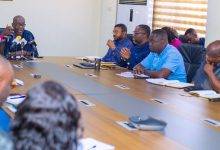The World Health Organisation has designated every year October 13 as the International Day for Disaster Risk Reduction, to raise awareness about our vulnerability to disasters and to renew the resolve to build resilience against disasters.
Surprising, the day was ‘observed’ in Ghana on a quiet note, hardly with any major event to educate the public about its significance and what we need to do, in our small ways, to help reduce or protect ourselves from disasters.
Human beings are at the centre of disaster, and poor and disadvantaged communities are often at the receiving end of disasters.
Disasters are sudden and calamitous, and often result in huge impact on vulnerable communities. Calamities do not cause only loss of lives and property, but also affect the economy and environment, most often exceeding the abilities of communities to cope with them.
Common examples of disasters are earthquake, landslide, tsunami, volcano, drought, floods, wildfire, cyclone, storm, diseases and insects or animal plagues.
Ghana is susceptible to floods, which have become perennial and difficult to contain.
Additionally, we are battling with a major disaster of the century; the global COVID-19 pandemic that has hit the world hard with its attendant loss of over one million lives and disruption of the global economic systems, putting many at the brink of poverty.
Indeed, this year’s International Day for Disaster Risk Reduction had been ‘observed’ on the theme “Disaster risk governance.”
Disaster risk governance is measured by the number of lives saved during disasters, reduction in the number of affected people and economic loss.
Very often, when disasters occur in the country, the first port of call is the National Disaster Management Organisation, whose personnel are sometimes overwhelmed for lack of capacity to deal with emergencies.
The theme for this year’s event is most appropriate in the Ghanaian context, because perennial disasters such as floods are largely caused by human factors, including building on water ways.
We, therefore, urge officialdom to promote disaster risk governance by ensuring that the environment is safe and resilient, to be able to withstand disasters.
Metropolitan, Municipal and District Assemblies must not compromise on the protection of the environment, lives and property, by issuing permits to only people seeking to build at authorised places.
Under the Sustainable Development Goal 3 (SDGs), we are expected to take action to combat climate change and its impact, by strengthening our resilience and adaptive capacity to deal with hazards and natural disasters.
We are also expected under SDG 11 to, among other actions, substantially increase the number of cities and human settlements.
There is the need for us to implement integrated policies and plans, to tackle issues of climate change and disasters in line with the Sendai Framework for Disaster Reduction, 2015-2030.
We need to strengthen our resilience against disasters through an effective “Disaster risk governance” regime!


